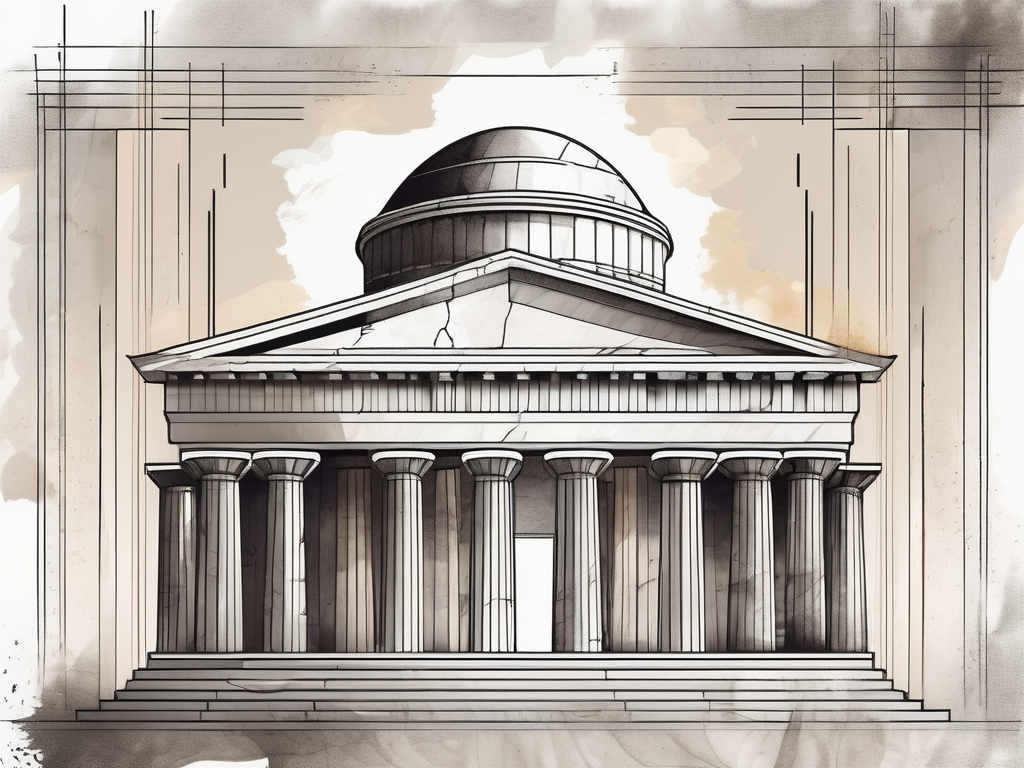Epicurus, a name that resonates through the annals of philosophy, is a figure whose ideas continue to captivate and challenge our understanding of life, pleasure, and the pursuit of happiness. Born in 341 BCE on the island of Samos, Greece, Epicurus was destined to become one of the most influential thinkers of his time and beyond. Let’s delve into the life and philosophy of this remarkable man, exploring the core principles of Epicureanism, debunking myths surrounding his teachings, and understanding his lasting legacy in the realm of philosophical thought.
Understanding Epicurus: The Man and His Philosophy
Epicurus’s journey towards becoming a prominent philosopher was shaped by a diverse array of experiences and influencers. Growing up during a time of political turbulence, his early life was marked by the shifting landscape of power and conflict. However, even in the midst of chaos, Epicurus found solace in the teachings of Democritus, a philosopher whose atomistic theory fascinated and shaped his worldview.
Embarking on a philosophical journey of his own, Epicurus sought to unravel the mysteries of existence and the pursuit of happiness. He founded a school known as “The Garden,” where his ideas would take root and flourish. Epicurus believed that philosophy should serve as a practical guide to living a fulfilling life, free from unnecessary suffering and stifling dogmas.
Early Life and Influences
Born to a family of relative privilege, Epicurus received an education that allowed him to explore various schools of thought. Inspired by the works of Plato and Aristotle, he developed a keen interest in ethics and the pursuit of a virtuous life. However, it was the teachings of Democritus, with his theory that the world is composed of tiny, indivisible atoms, that truly ignited Epicurus’s intellectual curiosity.
Understanding the physical world as a product of complex atomic interactions, Epicurus posited that human existence should be centered around pursuing pleasure and avoiding pain. This seemingly hedonistic philosophy, however, was far from a license for unrestrained indulgence. Instead, it advocated for a balanced approach to pleasure, focusing on the cultivation of simple pleasures over fleeting and unsustainable forms of gratification.
Epicurus’s Philosophical Journey
Epicurus’s philosophical journey was marked by a desire to understand the nature of reality and the role of pleasure in human existence. He believed that the ultimate goal in life was to attain ataraxia, a state of tranquility and freedom from anxiety, achieved through the pursuit of pleasure and the avoidance of pain. To him, virtue was intimately intertwined with pleasure, as the virtuous life leads to the greatest long-term pleasure and fulfillment.
Rejecting supernatural explanations and focusing on the natural world, Epicurus aimed to demystify the universe and provide a rational framework for human happiness. He emphasized the pursuit of knowledge and the importance of friendship and community in attaining a well-lived life. For Epicurus, philosophy was not merely a theoretical exercise but a practical tool to help individuals navigate the complexities of existence.
Epicureanism: A Closer Look
Epicureanism, the philosophical school founded by Epicurus, laid out a comprehensive framework for a good life. At its core were three fundamental principles: pleasure, autonomy, and tranquility.
The Core Principles of Epicureanism
According to Epicurus, pleasure was the highest good, but not all pleasures were created equal. He distinguished between “kinetic” and “katastematic” pleasures, with the latter being the true source of lasting fulfillment. Katastematic pleasures were characterized by tranquility, an absence of pain or disturbance, and a sense of contentment. Kinetic pleasures, on the other hand, were fleeting and often came with unforeseen consequences.
The pursuit of pleasure should not be equated with instant gratification or the relentless pursuit of physical desires. For Epicurus, true pleasure was achieved through the cultivation of virtues, such as wisdom, temperance, and justice. It involved living modestly, satisfying our basic needs without excessive luxury or extravagance.
Epicureanism vs. Other Greek Philosophies
Epicurus’s philosophy diverged significantly from other popular Greek philosophies of his time. While Stoicism emphasized the endurance of pain and the suppression of desires, Epicureanism celebrated the pursuit of pleasure as a means to a harmonious life. Skepticism, another prevalent philosophy, presented doubt as the pathway to wisdom, whereas Epicurus advocated for the pursuit of knowledge and the rejection of unnecessary complexity.
The philosophy of Epicurus resonated with many, offering a unique perspective that centered around the individual’s autonomy and the pursuit of a tranquil existence. It presented an alternative to the widely accepted belief that pleasure was inherently sinful or frivolous, asserting instead its crucial role in a well-lived life.
The Epicurean Pursuit of Pleasure
At the heart of Epicurus’s philosophy lay a profound investigation into the nature of pleasure and its relationship to human happiness. Contrary to popular misconceptions, Epicurus did not advocate for mindless indulgence or hedonistic excess. Instead, he posited a nuanced understanding of pleasure that focused on sustainable, meaningful fulfillment.
Defining Pleasure in Epicurean Terms
For Epicurus, pleasure was not limited to immediate sensory gratification. It encompassed both physical and intellectual joys, emphasizing the pursuit of long-term, soul-nourishing satisfaction. He believed that true pleasure could only be attained through a deep appreciation of the present, a gratitude for simple pleasures, and a rejection of unnecessary desires that can lead to dissatisfaction and pain.
In the Epicurean pursuit of pleasure, moderation played a vital role. Engaging in excess, whether in material possessions or indulgent behaviors, risked undermining the very tranquility and contentment sought after. By practicing self-control and embracing a measured approach to pleasure, individuals could achieve sustained joy and free themselves from the tyrannies of insatiable desire.
The Role of Desire in Epicurean Philosophy
Desire, according to Epicurus, was both a driving force and a potential source of suffering. While acknowledging its undeniable presence in human nature, he cautioned against becoming ensnared by ceaseless craving. Epicurus argued that by examining and understanding our desires, we can make informed choices and determine which desires are truly essential for happiness.
By channeling our desires towards virtuous and fulfilling goals, we can align them with our values and cultivate a life of harmony and satisfaction. This involved learning to differentiate between natural and unnecessary desires, embracing those that contribute to our overall well-being while letting go of those that only serve to distract and burden us.
Epicurus’s Legacy in Philosophy
Epicurus’s philosophy was not confined to his own time but continued to influence subsequent generations of thinkers and philosophical movements. His ideas, once confined to the peaceful walls of “The Garden,” found their way into the broader world, leaving an indelible mark on the development of Western philosophical thought.
Impact on Later Philosophical Thought
Epicurus’s contributions extended far beyond his immediate disciples. The Roman philosopher Lucretius, in his magnum opus “De Rerum Natura,” expanded upon Epicurean ideas and introduced them to a broader audience. Centuries later, during the Renaissance, Epicurus’s writings resurfaced, igniting intellectual curiosity and challenging traditional religious and philosophical beliefs.
His focus on the pursuit of pleasure, the examination of desires, and the rejection of unnecessary complexity found echoes in the works of Enlightenment thinkers like John Locke and Thomas Jefferson. The principles of personal autonomy and the pursuit of happiness, enshrined in the United States Declaration of Independence, bear the unmistakable influence of Epicurus.
Epicurus’s Teachings in Modern Times
Even in our contemporary world, Epicurus’s philosophy continues to captivate and inspire individuals seeking a path to contentment and balance. In an era marked by the relentless pursuit of material wealth and instant gratification, his emphasis on simplicity, self-reflection, and the cultivation of meaningful relationships offers a refreshing alternative.
Though often misunderstood and misrepresented, Epicurus’s ideas remind us of the importance of carving out space for tranquility, nurturing lasting pleasure, and embracing a life unburdened by unnecessary desires. As we grapple with the complexities of modern life, his teachings serve as a reminder that true happiness lies not in the accumulation of material possessions but in the pursuit of a virtuous, purposeful existence.
Debunking Myths about Epicurus and Epicureanism
Throughout history, Epicurus and his philosophy have garnered a fair share of misconceptions and misrepresentations. These myths, often perpetuated without a thorough understanding of his teachings, have obscured the true essence of Epicureanism and its rich legacy.
Misconceptions about Epicurean Hedonism
Contrary to popular belief, Epicurus advocated for a form of hedonism that emphasized tranquility, modesty, and the cultivation of philosophical virtues. His vision of pleasure was far from the uninhibited pursuit of sensual gratification. Instead, it revolved around finding contentment and lasting fulfillment through a mindful and balanced approach to life.
Epicurus understood that the relentless pursuit of excessive pleasure could lead to dissatisfaction, pain, and a perpetual cycle of unfulfilled desires. By rejecting unnecessary desires and embracing a measured and intentional pursuit of pleasure, individuals could attain a tranquil and fulfilled existence.
Epicurus and the Fear of Death
Another myth surrounding Epicureanism is the notion that Epicurus dismissed the fear of death or advocated a hedonistic embrace of mortality. On the contrary, he sought to alleviate the anxieties associated with death and unravel the irrational fears that engulfed us.
Epicurus believed that death should not be feared because it marks the end of consciousness and all sensations. He argued that the fear of death stemmed from irrationality rather than the inherent nature of death itself. Consequently, he encouraged individuals to embrace a realistic understanding of mortality, focusing on the present and the pursuit of a fulfilling life rather than fixating on an unknowable future.
Conclusion
Epicurus, the Greek philosopher of epic proportions, left an indelible mark on the world of philosophy. His emphasis on the pursuit of pleasure, the cultivation of virtues, and the rejection of unnecessary desires continue to inspire and challenge us to this day.
Amidst the chaos and complexities of existence, Epicurus offered a guiding philosophy that celebrated a life well-lived, grounded in tranquility, and enriched by meaningful connections. By embracing his teachings, we can navigate the intricate maze of desires and find solace in the pursuit of genuine happiness.












